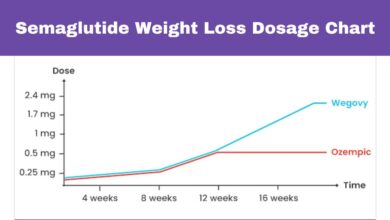The Ultimate Guide to Help You Honey Boo Boo Weight Loss

In recent years, weight loss has become an important topic for many, especially in the context of public figures like Honey Boo Boo. As individuals across the world become more health-conscious, the journey of losing weight has transformed into a significant life challenge. Honey Boo Boo, a reality TV star, has faced a public struggle with weight loss, which has garnered much attention. This comprehensive guide is designed to help you understand the intricacies of weight loss and provide actionable steps to achieve your goals.
Understanding the Weight Loss Journey
Weight loss is more than just a physical transformation; it is a holistic process that involves mental, emotional, and social aspects. It requires dedication, patience, and a well-structured plan. The key to successful weight loss is consistency. Understanding your body’s needs and developing a sustainable lifestyle are crucial for long-term success.
The Importance of Setting Realistic Goals
Before embarking on your weight loss journey, it is essential to set realistic and achievable goals. Unrealistic expectations can lead to frustration and may cause you to abandon your efforts. Start by determining your ideal body weight based on your height, age, and overall health. Consult with a healthcare professional to set goals that are attainable and healthy.
Nutrition: The Foundation of Weight Loss
A balanced diet is the cornerstone of any successful weight loss plan. To lose weight effectively, you must focus on nutrient-dense foods that provide essential vitamins and minerals while being low in calories. Incorporating a variety of fruits, vegetables, lean proteins, and whole grains into your diet will ensure that your body receives the necessary nutrients to function optimally.
Caloric Intake and Portion Control
Understanding the relationship between caloric intake and weight loss is vital. To lose weight, you must create a caloric deficit, which means consuming fewer calories than your body burns. However, it is important to do this in a healthy and sustainable way. Avoid extreme diets that severely restrict caloric intake, as they can lead to nutrient deficiencies and other health issues. Instead, focus on portion control and making healthier food choices.
The Role of Macronutrients
Macronutrients—proteins, carbohydrates, and fats—play a crucial role in weight loss. Each macronutrient has a specific function in the body:
- Proteins: Essential for muscle repair and growth, proteins help you maintain muscle mass while losing fat. Include sources like lean meats, eggs, legumes, and dairy in your diet.
- Carbohydrates: While often demonized in weight loss diets, carbohydrates are necessary for providing energy. Choose complex carbs like whole grains, fruits, and vegetables.
- Fats: Healthy fats are vital for hormone production and overall health. Opt for sources such as avocados, nuts, seeds, and olive oil.
Exercise: A Key Component of Weight Loss
While nutrition is fundamental, physical activity is equally important for weight loss. Exercise helps you burn calories, build muscle, and improve overall health. It is recommended to engage in at least 150 minutes of moderate aerobic activity or 75 minutes of vigorous activity per week, along with muscle-strengthening exercises.
Cardiovascular Exercise
Cardiovascular exercises, such as running, cycling, and swimming, are effective for burning calories and improving heart health. Incorporate a mix of high-intensity interval training (HIIT) and steady-state cardio into your routine to maximize fat loss.
Strength Training
Strength training is essential for building and maintaining muscle mass. Muscle tissue burns more calories at rest than fat tissue, which means that increasing your muscle mass can boost your metabolism. Incorporate exercises like weightlifting, bodyweight exercises, and resistance training into your routine.
Flexibility and Balance
Don’t overlook flexibility and balance exercises, such as yoga and Pilates. These activities help improve posture, prevent injuries, and enhance overall well-being.
The Psychological Aspect of Weight Loss
The mental and emotional components of weight loss are often underestimated. Motivation, self-discipline, and mental resilience are critical factors in achieving long-term success. Developing a positive mindset and managing stress are crucial for staying on track.
Building a Support System
Surrounding yourself with supportive friends, family, or a weight loss group can make a significant difference. A support system provides encouragement, accountability, and a sense of community, which can help you stay motivated during challenging times.
Mindful Eating
Mindful eating involves paying attention to what, when, and how you eat. It encourages you to savor your food, recognize hunger and fullness cues, and avoid emotional eating. Practicing mindful eating can lead to better food choices and a more enjoyable eating experience.
Monitoring Progress and Making Adjustments
Regularly tracking your progress is essential for staying motivated and making necessary adjustments to your plan. Use tools like food diaries, fitness apps, or wearable devices to monitor your diet and exercise. If you notice a plateau or a decline in progress, reassess your goals and make the necessary changes to your nutrition or exercise routine.
The Importance of Rest and Recovery
Rest and recovery are just as important as diet and exercise in a weight loss journey. Adequate sleep is crucial for overall health, as it allows your body to repair and recharge. Aim for 7-9 hours of sleep per night to support your weight loss efforts.
Common Weight Loss Pitfalls and How to Avoid Them
Many people encounter obstacles during their weight loss journey. Crash diets, over-exercising, and negative self-talk are common pitfalls that can derail your progress. Instead of resorting to extreme measures, focus on making sustainable lifestyle changes that you can maintain in the long term.
Avoiding Fad Diets
Fad diets often promise quick results but are not sustainable in the long run. These diets can lead to nutrient deficiencies, muscle loss, and a slowed metabolism. Instead, adopt a balanced diet that you can stick to for life.
Listening to Your Body
It is important to listen to your body and avoid pushing yourself too hard. Over-exercising can lead to burnout and injuries, while extreme dieting can harm your mental and physical health. Balance is key to a successful weight loss journey.
Conclusion: Your Path to Successful Weight Loss
Weight loss is a complex and multifaceted process that requires dedication, patience, and a well-structured plan. By focusing on nutrition, exercise, mental well-being, and rest, you can achieve and maintain your weight loss goals. Remember, the journey is just as important as the destination. Embrace the process, stay consistent, and make sustainable changes for a healthier and happier life.



